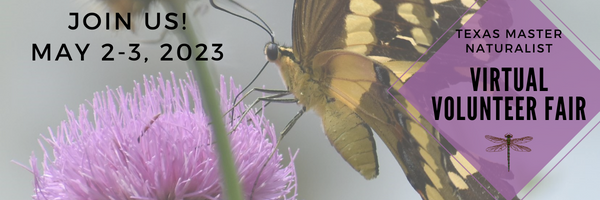
Our volunteers are ready to volunteer! Our Texas Master Naturalist Volunteers are dedicated to natural resource conservation work. After the innovations of the pandemic, we’re continuing to think outside of the box for how Texas Master Naturalist volunteers can assist our partner conservation organizations in their communities. At the height of the pandemic, due to extreme circumstances, our members were limited in conducting many of their typical outreach projects technical guidance and community stewardship service projects. Thus, our program transitioned to offer virtual and distanced service projects. This returning feature of our program has been so popular, our volunteers continue to ask for more similar projects to conduct during the hottest months of the year.
The TMN Virtual Volunteer Fair (VVF) is an opportunity for our partner conservation organizations to present service projects that need volunteers from a distance or virtually! After four successful TMN VVF events our members are asking for more! This time with the intent to provide virtual service during the hottest months of the year when service in the field becomes less desirable and hits a typical lull until cooler months come around.
The Virtual Volunteer Fair will be an opportunity for our partner conservation organizations to present volunteer service projects that need volunteers from a distance or virtually! Save the Date and plan to join us on May 2nd and 3rd 2023, for this series of project presentations showcasing opportunities from across the state and across the spectrum of natural resource topics.
How do I Sign up to Volunteer?

As an attending Texas Master Naturalist what can I expect?
Get ready to volunteer!
The Texas Master Naturalist Program is planning to host its fifth Virtual Volunteer Fair this spring: Tuesday and Wednesday, May 2nd and 3rd 2023 with a series of 15-minute sessions highlighting projects by a variety of partner conservation agencies and organizations.
Sessions will be recorded and uploaded to our website post-event for those who cannot attend the live presentations.
Virtual Volunteer Fair Agenda
The following projects are described in the “Catalog of Projects” in the order presented below.
Tuesday, May 2nd
9:00 AM – 9:15 AM Introduction
9:15 AM – 9:30 AM Butterfly Monitoring – Irmi Willcockson, Gulf Coast Chapter President, Texas Butterfly Monitoring Network Co-Chair
9:30 AM – 9:45 AM Time to Restore: Connecting People, Plants, and Pollinators – Samantha Brewer, Volunteer Engagement Coordinator
9:45 AM – 10:00 AM Armchair Botanist: Mapping the Plants of Texas – Ashley Bordelon, Herbarium Collections Manager
10:00 AM – 10:15 AM Capturing Conservation: Researching Conservation Organizations, Projects, & Issues by Texas Ecoregion – Taylor Keys, Program Director
10:15 AM – 10:30 AM Plants of Texas Rangelands Virtual Herbarium – Megan Clayton, Professor & Extension Range Specialist
10:30 AM – 10:45 AM Woody Plant Encroachment in Grasslands: Teaching by RAP ’ping – Erika Sullivan, Master Student
10:45 AM – 11:00 AM Review of Knowledge for Species Potentially Impacted by Wind Energy Development in the Gulf of Mexico – Rachel Lange, NRS-IV Habitat Assessment Biologist
11:00 AM – 11:15 AM Conclusion & Wrap Up
Wednesday, May 3rd
9:00 AM – 9:15 AM Introduction
9:15 AM – 9:30 AM Eclipse Educators! – Dorian Janney, Education and Outreach Coordinator
9:30 AM – 9:45 AM Macroinvertebrate Guide and Student Worksheet – Melissa Felty (Alderson), Conservation Education Manager
9:45 AM – 10:00 AM Texas Aquatic Science TEKS Alignment – Melissa Felty (Alderson), Conservation Education Manager
10:00 AM – 10:15 AM Virtual Tour of Texas: Flora and Fauna of Every Ecoregion – Karina Araujo, Marketing Manager
10:15 AM – 10:30 AM Discovering Bigtooth Maple Canyons: The Hunt to Map a Unique Texas Habitat – Amie Treuer-Kuehn, Ecologist
10:30 AM – 10:45 AM Natural History & Environment of Jackson Plantation Historic Site – Katelyn Landry, Program & Education Coordinator
10:45 AM – 11:00 AM Seasonal trifold pamphlets for Cooper Lake State Park Complex – Alicia O’Connor, Park Interpreter
11:00 AM – 11:15 AM Conclusion & Wrap Up
Catalog of Projects
The Catalog of Projects below list ALL service project details along with the Project Contact and their email address. If you are interested in a particular project, please reach out to the Project Contact directly if you did not get a chance to sign up during the event.
In addition, the projects are noted as statewide or by eco-region in the project description. Keep in mind that some site-based projects may offer aspects of the project that don’t require your presence at the site. If they do require your presence to assist, please make sure to consider the project’s location compared to your chapter’s region and your training as a Master Naturalist. Be sure projects you choose are within ecoregion(s) you are trained for and are pre-approved by your chapter.
How do I join?
Registration to attend our Virtual Volunteer Fair is now open. It is free to register! You can attend any or all project proposal presentations – come and go as you please! TMN volunteers will earn Volunteer Service hours for attending all project proposal sessions – please use the “TMN Virtual Volunteer Service Fair” Statewide Project Opportunity for logging service hours.
If you’ve never used WebEx as a platform at all, the WebEx 101 Guide linked is a great place to start – plus there are live testing sites on the Cisco WebEx page for any day users to test their equipment and set up.
REGISTRATION IS CLOSED
How do I Sign up to Volunteer?
At the completion of EACH project proposal and then again at the end of the event, we will share the “Project Volunteer Registration” survey.
https://www.surveymonkey.com/r/TMNVVF2023
Sign ups close on May 24th!
How do I log Hours?
Texas Master Naturalists can earn hours for attending the Virtual Volunteer Fair and for participating in service projects presented during the fair. A VMS (Volunteer Management System) Quick Guide reference document has been created to help show these opportunities and how to log them: VMS Quick Guide
Project Host Resources
Project Host and Presenter – you will be given a 15-minute time slot in the Virtual Volunteer Fair to present your project, using our template to highlight the tasks, expertise and help you need. We will offer time during the event to answer questions and sign up volunteers too. The skeleton PPT template for you to use during your presentation is downloadable here:
During our February 2021 Virtual Volunteer Fair, we offered a wonderful session on “Managing Texas Master Naturalist Volunteers in Person and Virtually” by Lindsay Pannell (Palo Duro State Park Interpreter) and Louisa Torrance (Distance Learning Coordinator). They shared how to create a successful recruiting presentation and plan and how to manage the volunteers that want to help you with your project(s). Their tips, techniques, and best practices working with TMN volunteers in distanced and virtual service projects can be viewed below, as well as the slides used:
TMN-Presentation-Project-Host-How-ToDownload
Call for Proposals – NOW CLOSED
Have a project idea but need help doing it? Do you have field data to collect? Computer research to do? If it can be done by volunteers, our Texas Master Naturalists can help!
We are seeking your “Virtual” and “Distance Based Service” project opportunities to add to our Texas Master Naturalist Program’s “Virtual Volunteer Service Fair”! You will present your project(s) online to our statewide membership of Texas Master Naturalist volunteers on May 2nd and May 3rd, 2023 with short 5-10 minute spotlight presentations to highlight the tasks, expertise and help you need. We will offer time during the event to answer questions and opportunities for volunteers to sign up too!
Consider this when developing your project ideas – How could a natural resource trained volunteer help ease your workload from afar or fulfill virtual tasks? Try to connect their training and skills with your project needs that can be completed by volunteers working remotely.
Submitted Projects will be organized into the following categories:
- Virtual Projects
- Distance Based Projects *Ecoregion Specific
- Distance Based Projects *Statewide
- NOTE: Place based projects are accepted but will be referred to the nearest chapter(s) where applicable.
What are “Virtual” Projects for Master Naturalist volunteers?
-Any natural resource service that can be done from a computer.
“Virtual” Project Ideas:
• Recruiting curators for needed Texas Nature Tracker projects.
• Develop flora or fauna guides from collected photos or data
• Develop social media content (informational posts, videos, public interaction prompts)
• Perform accessibility reviews on our web pages.
• Review web pages for accuracy, information updates, broken links, etc.
• Technical Guidance video transcriptions
• Literature reviews covering the next Species of Greatest Conservation Need (SGCN) species you will be focusing on.
• Mining field resource data
• Writing short article spotlights on species of concern or management practices
What are “Distance Based Service” Projects for Master Naturalist volunteers?
-Any natural resource service that can be done independently (field work or otherwise)
-Any natural resource service that can be done from a vehicle/road
-Any natural resource service that can be conducted with social distancing protocols in place where required.
Note the two classifications of Distance Based Service Projects
- Distance Based Projects *Ecoregion Specific – Those that are place-based “distance service” projects (i.e hosted at a nature center or state park) will be initially deferred to the local TMN chapter(s) servicing that county/region.
- Distance Based Projects *Statewide – Projects that are open to statewide volunteer input or have statewide application of service and can occur within any given master naturalist chapter’s territory (i.e water quality testing that can occur in the TMN volunteer’s local county/region territory) and these will be considered for presentation at the virtual volunteer fair.
“Distance Based Service” Project Ideas:
• TMN Chapters adopt Wildlife Viewing Trail maintenance and surveys
• Water Quality testing at specific waterbodies
• Pollinator surveys at public native garden spaces
• Invasive species control at place-based sites (i.e state parks or nature centers)


